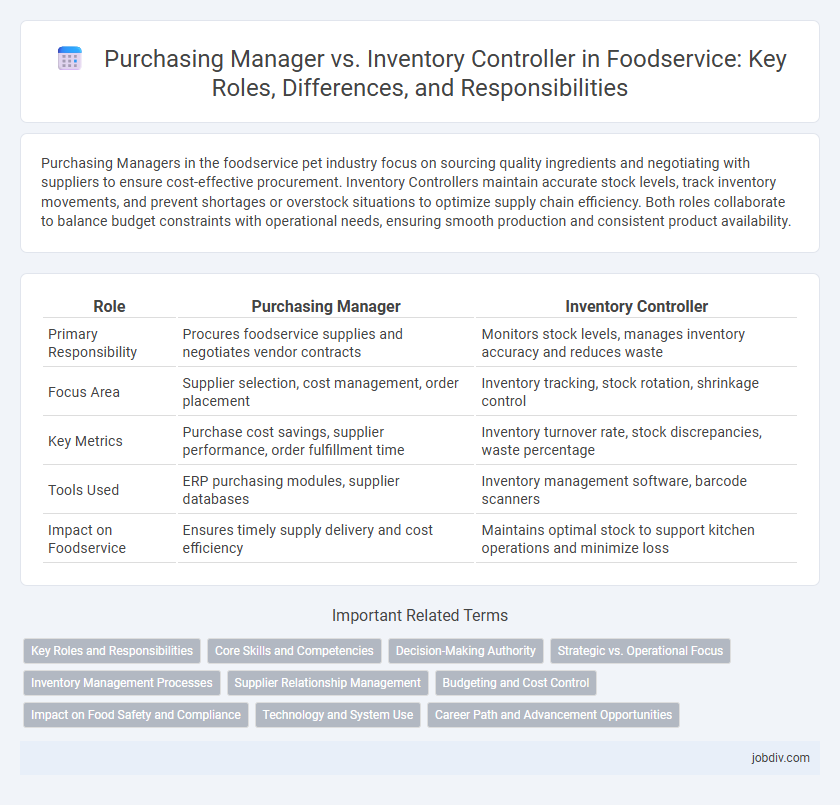Purchasing Managers in the foodservice pet industry focus on sourcing quality ingredients and negotiating with suppliers to ensure cost-effective procurement. Inventory Controllers maintain accurate stock levels, track inventory movements, and prevent shortages or overstock situations to optimize supply chain efficiency. Both roles collaborate to balance budget constraints with operational needs, ensuring smooth production and consistent product availability.
Table of Comparison
| Role | Purchasing Manager | Inventory Controller |
|---|---|---|
| Primary Responsibility | Procures foodservice supplies and negotiates vendor contracts | Monitors stock levels, manages inventory accuracy and reduces waste |
| Focus Area | Supplier selection, cost management, order placement | Inventory tracking, stock rotation, shrinkage control |
| Key Metrics | Purchase cost savings, supplier performance, order fulfillment time | Inventory turnover rate, stock discrepancies, waste percentage |
| Tools Used | ERP purchasing modules, supplier databases | Inventory management software, barcode scanners |
| Impact on Foodservice | Ensures timely supply delivery and cost efficiency | Maintains optimal stock to support kitchen operations and minimize loss |
Key Roles and Responsibilities
A Purchasing Manager in foodservice oversees vendor selection, negotiates contracts, and ensures cost-effective procurement of quality ingredients and supplies. An Inventory Controller monitors stock levels, manages inventory accuracy, and implements systems to minimize waste and prevent shortages. Both roles collaborate to optimize supply chain efficiency and maintain seamless kitchen operations.
Core Skills and Competencies
Purchasing Managers in foodservice excel in supplier negotiation, cost analysis, and procurement strategy to ensure quality and budget compliance. Inventory Controllers specialize in stock management, demand forecasting, and loss prevention to maintain optimal inventory levels and minimize waste. Both roles require strong analytical skills, attention to detail, and proficiency with inventory management software for efficient supply chain operations.
Decision-Making Authority
Purchasing Managers in foodservice hold greater decision-making authority, overseeing supplier negotiations, contract approvals, and budgeting to ensure cost-effective procurement of ingredients and equipment. Inventory Controllers focus on tracking stock levels, managing reorder points, and preventing waste, with limited authority primarily focused on operational execution rather than strategic purchasing decisions. The distinction lies in Purchasing Managers directing procurement strategy, while Inventory Controllers support inventory accuracy and availability.
Strategic vs. Operational Focus
Purchasing Managers in foodservice concentrate on strategic supplier relationships, cost negotiation, and long-term procurement planning to ensure quality and sustainability. Inventory Controllers focus operationally on stock accuracy, timely replenishment, and minimizing waste to maintain seamless kitchen workflows. Both roles are integral, with Purchasing Managers driving cost efficiency and Inventory Controllers ensuring daily inventory accuracy.
Inventory Management Processes
Purchasing Managers in foodservice oversee supplier negotiations and order placements to ensure timely procurement of high-quality ingredients, directly impacting cost control and menu consistency. Inventory Controllers focus on tracking stock levels, minimizing waste, and implementing accurate forecasting models to optimize storage and prevent shortages or overstock. Effective collaboration between Purchasing Managers and Inventory Controllers enhances inventory management processes, ensuring operational efficiency and profitability.
Supplier Relationship Management
Purchasing Managers in foodservice primarily lead Supplier Relationship Management by negotiating contracts, ensuring quality standards, and securing favorable pricing to optimize procurement processes. Inventory Controllers focus on maintaining accurate stock levels and coordinating with suppliers to prevent shortages and overstock situations, supporting seamless operations. Effective collaboration between both roles enhances supplier communication, improves order accuracy, and drives cost efficiency.
Budgeting and Cost Control
Purchasing Managers in foodservice focus on strategic sourcing, supplier negotiation, and budget allocation to optimize overall cost efficiency. Inventory Controllers concentrate on monitoring stock levels, minimizing waste, and ensuring accurate inventory records to prevent overstocking and reduce holding costs. Both roles collaborate to maintain strict budgeting and cost control, balancing procurement expenses with effective inventory management.
Impact on Food Safety and Compliance
Purchasing Managers play a critical role in food safety by selecting suppliers who comply with industry standards and certifications, thereby ensuring the quality and safety of raw ingredients. Inventory Controllers maintain proper storage conditions and track shelf life, reducing the risk of spoilage and contamination in foodservice operations. Both roles are essential for maintaining compliance with food safety regulations such as HACCP and FDA guidelines, minimizing risks of foodborne illnesses.
Technology and System Use
Purchasing Managers in foodservice leverage advanced procurement software and ERP systems to optimize supplier selection, automate purchase orders, and analyze spend data for cost efficiency. Inventory Controllers utilize real-time inventory management systems and IoT-enabled sensors to track stock levels, reduce waste, and ensure accurate forecasting. Both roles depend on integrated technology platforms that enhance operational transparency and streamline supply chain processes.
Career Path and Advancement Opportunities
Purchasing Managers in foodservice often advance by specializing in supplier relations, contract negotiation, and strategic sourcing, leading to roles like Procurement Director or Supply Chain Manager. Inventory Controllers focus on optimizing stock levels and reducing waste, progressing towards positions such as Inventory Manager or Operations Manager. Both career paths emphasize analytical skills and efficiency but diverge in scope, with Purchasing Managers driving cost savings and Inventory Controllers ensuring operational continuity.
Purchasing Manager vs Inventory Controller Infographic

 jobdiv.com
jobdiv.com